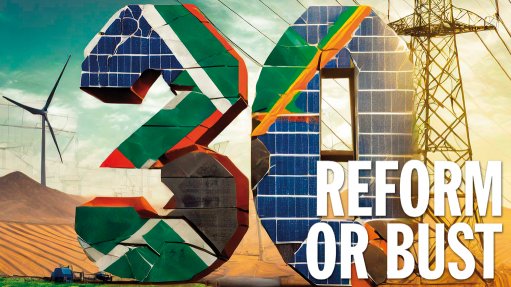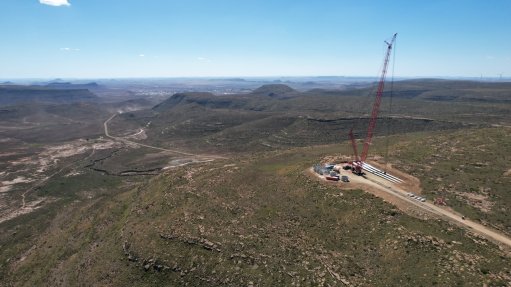Zikalala, panelists warn construction mafia poses an existential threat
Organised crime, particularly in the construction sector, has become more prevalent, more violent and more organised in recent years, with “mafia” activity having become fully fledged across the country.
Addressing delegates as part of a panel discussion hosted by Creamer Media on July 19, industry body Construction Alliance South Africa chairperson John Matthews confirmed that 682 extortion-related cases were being investigated and about R68-billion had been lost to the economy as a result of construction site disruptions since 2019.
The act of extortion and intimidation on construction sites is not new, law firm MDA Attorneys director Euan Massey said, pointing out that site disruptions first reared their head around 2008 with the Medupi and Kusile power stations.
He noted, however, that he was encouraged by the real interest shown by both the private and public sectors in tackling this scourge.
He noted that the procurement regulations gazetted in 2017 had set out a 30% local participation requirement for public sector contracts of more than R30-million in value, which added fuel to the fire, with much of the unrest around construction projects purportedly being related to the exclusion of small businesses or labour in the area.
Massey said the procurement regulations had created uncertainty around the world ‘local’ and whether it meant the immediate area, the province or the country.
The are other groups, however, that invade construction sites simply as an easy way to make money, he noted.
Matthews agreed, saying the disruptive groups included disgruntled community members with legitimate concerns through to so-called "mafia" organisations demanding 30% of profits.
Moreover, Massey explained that project owners had often left it up to the subcontractors to implement the local participation requirement, but said it was important for every stakeholder to play a role in this regard.
Massey added that, up to now, contractors had been responding reactively to construction site disruption. He stressed, however, that the response had to become proactive. “At the outset of projects, we need to identify the target enterprises for the 30% participation requirements and communicate how money will be spent to support local businesses.”
He pointed out that reactive measures such as court interdicts had had limited success at disrupted construction sites, owing to illicit business forums simply appointing different foot soldiers and thereby making null and void the court’s efforts to interdict a particular individual.
Massey said there had been a lack of unity among role-players as to how the issue of construction site disruption and extortion could be addressed.
He recommended the amendment of contracts as a standard practice to include a lead-in period to promote local participation and aspects on how to deal with site disruption to protect everyone’s rights.
Matthews conceded that it was often confusing as to how stakeholders should go about securing construction sites and who was accountable for the cost.
He added that the construction sector was always referred to as the employment catalyst in the economy, "but we cannot unlock that with these peripheral issues stakeholders have to deal with".
South African Green Industries Council administrator Bernadette Eksteen agreed, saying construction site disruptions had a significant impact on costs, timelines of projects and the overall health and safety of the industry.
A special guest of the panel discussion, Public Works and Infrastructure Minister Sihle Zikalala emphasised the need for stakeholders to condemn this threat with “one voice” and act together to root out these illegal practices that were bringing disrepute and driving away investment in the country.
He said construction site disruption activity was mainly a result of a lack of social cohesion in the country, which gave rise to criminality. Nevertheless, even though poverty and inequality still plagued society heavily, there was no grievance that justified site disruption, extortion and sabotage of the economy, Zikalaka asserted.
In doing its part, the Department of Public Works and Infrastructure earlier this year announced the provision of a social facilitation framework to mitigate against community unrest.
Zikalala pointed to the importance of constant public engagement and feedback, as well as the proper protection of whistleblowers during the panel discussion.
Institute for Security Studies justice and violence programme head Gareth Newham agreed with the other speakers that construction site disruption was causing huge damage to the sector’s ability to drive economic prosperity.
He expressed concern about the notable increase in violent organised crime over the last five years, with such crimes becoming more connected across various illicit markets, more connected regionally and internationally, more connected with powerful political leaders and increasingly violent.
“We have seen severe deterioration in the State’s law enforcement and intelligence capabilities.
“Criminals are targeting construction sites owing to the large budgets involved with these projects. The most important intervention would have to be improving law enforcement and crime intelligence capabilities of the State. The perpetrators need to suffer real consequences and fear prosecution, which is not the effect the current justice system is having.”
Newham wished for more cases to be publicised and more arrests of kingpins to occur, not just the arrests of "foot soldiers who are easily replaced".
Development confederation Black Business Council CEO Gregory Mofokeng commented that construction site disruption was not only directly impacting on economic growth but jobs created beyond the construction site. He referred to the jobs that would have been created once the structure was complete, particularly if the development was a shopping mall.
He said more politicians were cooperating with criminals and that councillors often arrived at construction sites alongside criminal groups. “We find that the councillors are more often involved and are encouraging people to stop projects, simply because certain individuals are not directly benefitting.”
Mofokeng called for a more visible police presence, as well as greater effort to arrest and sentence the masterminds behind illicit business forums.
Nonprofit organisation South African Women in Plumbing & Trades representative Kile Mteto lamented the fact that work stoppages on construction sites increased the cost of doing business, particularly for small women-owned entities, which already struggled to access opportunities.
She said the police were not doing enough to act against known criminals and that, when sites were disrupted, the opportunity for skills development was also stolen.
Mteto called for decisive action to end construction site disruption and extortion on everyone’s part – private sector, government, society and labour, since civil society also needed to report information on extortionists.
She added, in echoing the other speakers’ statements, that it was necessary for social facilitation to happen before construction starts so that communities were aware of upcoming opportunities and how procurement would work. Without the upfront work, the sector would continue to grapple with community unrest around construction sites.
Mteto believes it will soon become necessary to include risk management around site disruption as an inherent risk in business contracts if this scourge is not dealt with decisively.
Western Cape Property Development Forum chairperson Deon van Zyl, in his closing remarks, stated the importance of creating more opportunities in the market for small contractors, "especially if stakeholders are serious about building South Africa out of its economic slump".
He said the root cause of site disruptions related to a lack of opportunities for small businesses and labour.
Van Zyl added that the construction sector was not being kept “busy enough” and that the market needed to be flooded with opportunities.
Meanwhile, he agreed with some of the other experts that public engagement must start at the outset of a project, at the point of conception.
He concluded that contractors could not continue to be left to deal with all the consequences of lacking public engagement or site disruption, and that government must play its role in securing sites.
Comments
Press Office
Announcements
What's On
Subscribe to improve your user experience...
Option 1 (equivalent of R125 a month):
Receive a weekly copy of Creamer Media's Engineering News & Mining Weekly magazine
(print copy for those in South Africa and e-magazine for those outside of South Africa)
Receive daily email newsletters
Access to full search results
Access archive of magazine back copies
Access to Projects in Progress
Access to ONE Research Report of your choice in PDF format
Option 2 (equivalent of R375 a month):
All benefits from Option 1
PLUS
Access to Creamer Media's Research Channel Africa for ALL Research Reports, in PDF format, on various industrial and mining sectors
including Electricity; Water; Energy Transition; Hydrogen; Roads, Rail and Ports; Coal; Gold; Platinum; Battery Metals; etc.
Already a subscriber?
Forgotten your password?
Receive weekly copy of Creamer Media's Engineering News & Mining Weekly magazine (print copy for those in South Africa and e-magazine for those outside of South Africa)
➕
Recieve daily email newsletters
➕
Access to full search results
➕
Access archive of magazine back copies
➕
Access to Projects in Progress
➕
Access to ONE Research Report of your choice in PDF format
RESEARCH CHANNEL AFRICA
R4500 (equivalent of R375 a month)
SUBSCRIBEAll benefits from Option 1
➕
Access to Creamer Media's Research Channel Africa for ALL Research Reports on various industrial and mining sectors, in PDF format, including on:
Electricity
➕
Water
➕
Energy Transition
➕
Hydrogen
➕
Roads, Rail and Ports
➕
Coal
➕
Gold
➕
Platinum
➕
Battery Metals
➕
etc.
Receive all benefits from Option 1 or Option 2 delivered to numerous people at your company
➕
Multiple User names and Passwords for simultaneous log-ins
➕
Intranet integration access to all in your organisation




















